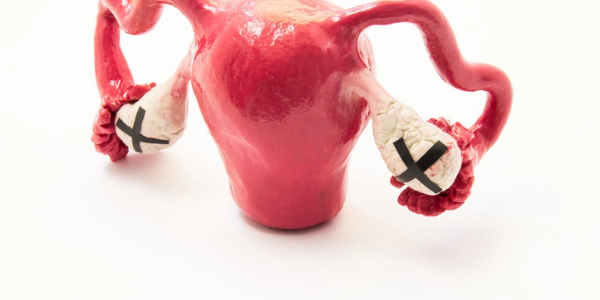New research published by a team of researchers from the University of Toronto in collaboration with colleagues from the University of Alberta has found that women who have both ovaries removed before the age of 50 and carry a variant of the apolipoprotein gene, the APOE4 allele, are at high risk of developing Alzheimer’s disease in old age. The use of hormone therapy reduces this risk.
Removal of the Ovaries and the Development of Alzheimer’s
By 2050, Alzheimer’s disease is expected to affect 12.7 million people over the age of 65, with two-thirds of them being women. It is still unclear why Alzheimer’s disease is more common in women than in men, but it may be related to events in early life, such as removal of the ovaries (oophorectomy). The researchers analyzed a cohort of 34,603 women from a large data set, the UK Biobank, and found that in this cohort, women who had both ovaries removed at around the age of 43 had a 4-fold higher risk of developing Alzheimer’s disease than women who experienced natural menopause at the median age of 54. The study was published online in the Journal of Alzheimer’s Disease.
The research team, led by Dr. Gillian Einstein, professor of psychology, Wilfred and Joyce Posluns Chair in Women’s Brain Health and Aging, and associate scientist at Baycrest Hospital, University of Toronto, set out to examine the risk and resilience factors for Alzheimer’s disease in women with early loss of estrogens. “One of our most important findings was the fact that the loss of the naturally occurring (endogenous) hormone estradiol as a result of surgical removal of both ovaries could interact with the APOE4 allele and further increase the risk of Alzheimer’s disease, placing women with early bilateral oophorectomy and APOE4 in a state of double jeopardy,” said Dr. Einstein. APOE4 is a well-known risk factor for Alzheimer’s disease in the general population, but poses a greater risk for women.
The study also identified resilience factors associated with risk of Alzheimer’s disease for these women. A high level of education was associated with a 9% lower likelihood of developing Alzheimer’s disease in women with both types of menopause – that caused by ovarian removal and that caused by aging. This supports previous research showing that education is a form of cognitive resilience in both women and men. Surprisingly, there was also a modest association between body mass index (BMI) and risk of Alzheimer’s disease, but only in women with early bilateral oophorectomy. Each additional unit of BMI was associated with a 7% lower risk of developing Alzheimer’s disease.
“A higher BMI may be associated with a reduced risk of Alzheimer’s disease in women who have had an ovariectomy, because adipose tissue produces estrone (one of the three endogenous estrogens), which, in the absence of estradiol ol deficiency due to oophorectomy may help maintain cognitive function in early middle age,” said first author Dr. Noelia Calvo, a postdoctoral fellow in Dr. Einstein’s laboratory at the University of Toronto.
Women With Ovariectomy May Have Suffered Early Estradiol Loss
Importantly, among women with early bilateral oophorectomy who had ever used HT, the odds of developing Alzheimer’s disease were not even half as high as among women who had never used HT.
“This finding highlights the importance of estrogen-based therapies in reducing the risk of Alzheimer’s disease for women who have had their ovaries surgically removed before the age of 50,” said co-author Dr. Esme Fuller-Thomson, professor at the Factor Inwentash Faculty of Social Work at the University of Toronto and director of the Institute for the Life Course and Aging. It is interesting to note, however, that hormone therapy was not associated with a lower risk of Alzheimer’s disease in those who experienced natural menopause at age 51 or older.
The researchers explored possible reasons for this discrepancy. It could be because women who had their ovaries removed at a young age experienced estradiol loss when the need for this hormone was potentially greatest, given that their menopause occurred on average 11 years earlier than in women who went through natural menopause. Taken together, the results extend past findings indicating that women with early bilateral oophorectomy are at high risk for Alzheimer’s disease due to an association between APOE4 and estradiol loss in this cohort.






